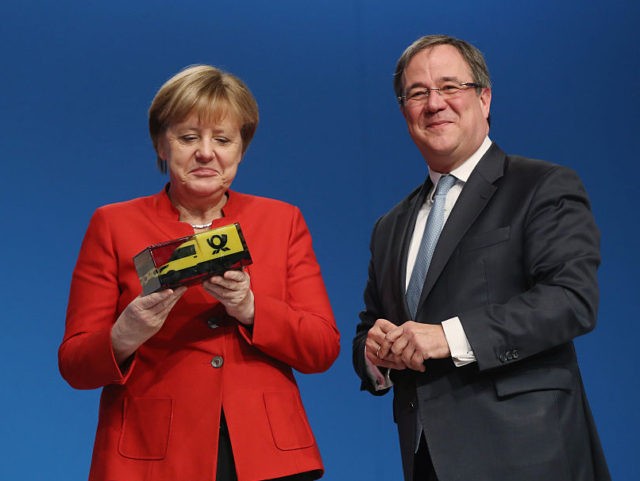Germany’s ruling CDU is having a second shake at replacing longtime chancellor and de facto leader of Europe Angela Merkel, with state president and party chairman Armin Laschet emerging victorious from the months-long power struggle on Tuesday.
Armin Laschet, the President of Germany’s most populous federal state North-Rhine Westphalia, and who became the chairman of the national Christian Democratic Union (CDU) party in January, was selected on Tuesday to lead the nation’s largest party into the forthcoming elections. The centre-right leader is a former long-serving member of the European Parliament.
If Laschet is able to steer the CDU to victory, he will replace Angela Merkel as chancellor of the European Union’s largest economy, but will get no taste of power beforehand. Veteran leader Merkel — who has governed Germany since 2005 — has decided to keep the top job until the election itself, despite the fact she is no longer the leader of her dominant CDU party.
Merkel’s Party Bloc Dips in Polls Six Months Before German Election https://t.co/eFn0xm7Qja
— Breitbart London (@BreitbartLondon) March 28, 2021
Selecting a new leader while staying in office, she had said, will give the nation time to get used to the new leader of the party without actually having to relinquish power herself. In some ways Merkel’s decision on the timetable for departure could be seen as one of the longest resignations in history, as she announced she would be stepping down at the 2021 national elections the day after the last national election, in 2018.
Merkel’s party performed poorly in that election, falling 11.3 per cent on the previous vote. As Breitbart London reported at the time, announcing her departure date immediately — even if it was years hence — forestalled the possibility of a coup against Dr Merkel, giving her the maximum time in office. Clearly, the strategy has worked — although perhaps it has worked too well.
The selection of Laschet is the second time the CDU has tried to replace Merkel in as many months. After the chancellor first announced the long roadmap to her leaving power in 2018, the party started looking for a new leader and in December of that year selected Annegret Kramp-Karrenbauer to lead. Yet AKK, or ‘Mini-Merkel’ as she was known, struggled to flourish in Merkel’s shadow and establish a reputation and public following.
‘Every Vaccine is Welcome’: Merkel Looks to Russian Jab Amid EU Vax Blunders https://t.co/aMXLiIieR0
— Breitbart London (@BreitbartLondon) February 3, 2021
By 2019, there were rumours swirling in Germany that Dr Merkel was dissatisfied with her anointed successor and had effectively ‘unresigned’. She denied the claim, but nevertheless AKK later resigned, triggering a new leadership contest that saw North-Rhine Westphalia Armin Laschet leader go up against Bavaria leader Markus Soeder.
Both men have broadly similar policy views and as the Associated Press notes, the competition was more on personality than politics. Both men, for instance, support hardening Germany’s coronavirus lockdown and locked horns earlier this month over which would call for the harshest restrictions as they tussled for support.
Germany will go to the polls in September. One of the headline issues nationally is Germany’s poor rollout of coronavirus vaccines, a function of the nation’s decision — along with the rest of the bloc — to trust in the European Union’s effort to acquire vaccine doses. The Union fluffed key decisions and dithered in the early days, leaving Germany, a significant global player with a large domestic pharmaceutical industry, dawdling behind Brexit Britain, which decided to go its own way on vaccines instead of throwing its lot in with the European Commission it is no longer obliged to follow.
‘Merkel Successor’ Calls for Germany to Enter Even Tougher Lockdown https://t.co/9uR9231iKq
— Breitbart London (@BreitbartLondon) April 6, 2021

COMMENTS
Please let us know if you're having issues with commenting.